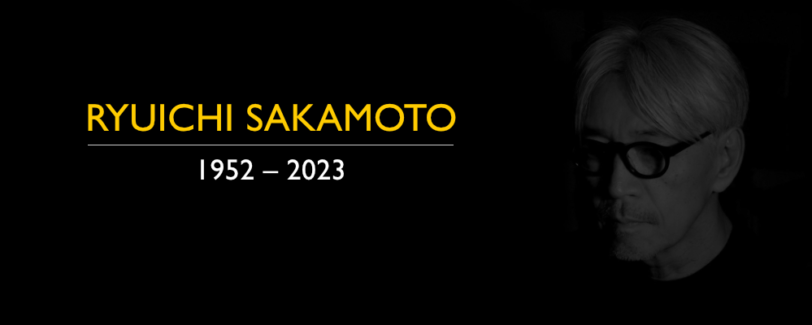The sad news of the passing of Ryuichi Sakamoto brings about an end to a particular chapter in the Japanese music industry, as well as the closing of a distinct period in the history of electronic music.
As one of Japan’s pioneering names in the world of electronic music, Sakamoto will always be associated with technopop outfit Yellow Magic Orchestra, a band that paved the way for a variety of electronic genres, including synth-pop, J-pop, electro and techno (The death of fellow YMO member Yukihiro Takahashi earlier this year leaves Haruomi Hosono as the sole member of the classic 3-piece line-up).
During the YMO era, Sakamoto also concurrently pursued a solo career, which included the release of his 1978 debut solo album Thousand Knives. In 1980, Sakamoto released the album B-2 Unit, notable for the song ‘Riot in Lagos’, seen as a big influence on electro artists such as Afrika Bambaataa and Kurtis Mantronik. Sakamoto’s extensive musical career has also touched a variety of different genres and roles over the years, including pianist, record producer, actor and composer. He was responsible for composing the startup sound for Sega’s Dreamcast gaming system in the late 1990s. In 2005, Finnish mobile phone manufacturer Nokia also hired Sakamoto to compose ringtones for their Nokia 8800 phone.
But his work as a composer for film soundtracks gave Sakamoto a higher global profile. His film, TV and anime soundtrack work has delivered an exceptional catalogue of titles, including his scoring debut with 1983’s Merry Christmas, Mr. Lawrence (which also stars Sakamoto alongside David Bowie). He was also responsible for scoring The Last Emperor in 1987, Little Buddha in 1995 and The Revenant in 2015.
Sakamoto won a number of awards for his work as a film composer, beginning with the BAFTA Award for Best Film Music for his score for Merry Christmas, Mr. Lawrence. His work for The Last Emperor won him the Academy Award for Best Original Score, Golden Globe Award for Best Original Score, and Grammy Award for Best Score Soundtrack Album for a Motion Picture, Television or Other Visual Media. Meanwhile, his score for The Sheltering Sky (1990) won him his second Golden Globe Award.
Sakamoto was diagnosed with throat cancer in 2014 which led to the musician taking a year’s hiatus. In 2017, Sakamoto released new album async. The textured tones of that record offered a contemplation on mortality and humanity, brought into sharp focus by his health concerns. In 2021, Sakamoto announced that although the original cancer was in remission, he was now diagnosed with rectal cancer and that he was currently undergoing treatment after a successful surgery. “I am hoping to make music for a little while longer” he commented at the time.
Over the years, his musical career also saw Sakamoto collaborate with a wide range of talents, including Thomas Dolby, David Sylvian, Virginia Astley, Roddy Frame, Youssou N’Dour, David Sylvian, and Ingrid Chavez.
Sakamoto also had a keen interest in activism. A member of the anti-nuclear organization Stop Rokkasho, in 2012, he organized the No Nukes 2012 concert, which featured performances by groups including Yellow Magic Orchestra and Kraftwerk. After the devastating Great East Japan Earthquake of 2011, Sakamoto also became music director of the Tohoku Youth Orchestra, a group of elementary, junior high, high school, and university students from the three prefectures affected by the earthquake. Sakamoto took part in the Tohoku Youth Orchestra’s concert in Tokyo in March 2022, in which a new symphony he composed, titled Ima Jikan ga Katamui te (now the time is tilting), was performed.
Despite his many achievements, Sakamoto was always very modest about his work. “When I look back on my life in occasions like these” he remarked in his 2009 autobiography Musik Macht Frei, “I’m reminded that I’m no revolutionary, I didn’t change the world, I haven’t left any piece of music that changed music history. In other words, it’s very clear that I’m an insufficient person.”
Ryuichi Sakamoto’s passing brings to an end a vital chapter in Japan’s contributions to electronic music. But as sad as this news is, it’s also a reminder of his rich catalogue of work, which spans an impressively broad number of disciplines.
Sakamoto’s Japanese record label commons announced the musician’s passing with the sharing of one of his favourite quotes:
“Art is long, life is short.”
photo by nss (zakkubalan).


